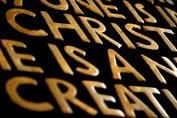Autobiography Reheated Reflection
 The journal can be though of in terms of a logbook, recording the progress of our journey. In the past people recorded their own experiences and insights into the Christian life. It was written largely in terms of autobiography. Heitzenrater writes that when Wesley began to write his journal there had already been an increasing number of people throughout history at that time who were willing to record their own experiences. He understands that the popular autobiography was undergoing changes in style as well as content not least because of the many and numerous expressions of it.
The journal can be though of in terms of a logbook, recording the progress of our journey. In the past people recorded their own experiences and insights into the Christian life. It was written largely in terms of autobiography. Heitzenrater writes that when Wesley began to write his journal there had already been an increasing number of people throughout history at that time who were willing to record their own experiences. He understands that the popular autobiography was undergoing changes in style as well as content not least because of the many and numerous expressions of it.The growing army of men and women who would now commit something of their experience and history to a diary or journal certainly implies a growing will to imagine, delimit, and affirm a self, and, eclectic in his style of journal writing as in his theology, Wesley embodied features of the styles of many of his contemporaries and predecessors in his own work. [1]
Heitzenrater traces the evolution of the biographical style in his introduction to Wesley’s journal. [2] He notes that Georg Misch traces the roots of biography to the Assyrians. Scholars were noted contributors to the genre in some cases others added the biographical details as an introduction to their work. Some had to record, in autobiographical terms, what brought them to live or write in this specific way as a defence of their position adding that founders of religious movements wrote, in some cases they were published posthumously as in George Fox the founder of the Society of Friends, better known as the Quakers. The Quakers were especially keen to record and publish the experience of individuals and their experience of the ‘leading of the Holy Spirit’.
Whilst autobiography isn’t always reflective in its record but rather a linear progression of events it can and often is reflective in the process of the writing after the events themselves. Strictly speaking the journal is what I think of as ‘raw reflection’ in real time. So the autobiography can be thought of as journaling on the past which can and should need reflection on the events being recorded whilst the journal is recording in the immediate sense what is being experienced or considered.
Clearly, journaling can be an effective means of communicating our experience to others especially if it is more immediate. Edwards, Whitefield and Wesley understood this and for this reason published their journals whilst they were still living. Not only does the Journal reach out to our contemporaries it can also be the means through which we are also able to reach across time. Through our writing we can transmit our faith into the future and this can be an effective means of instruction for our children and our children’s children. In my pastoral ministry I have often noted the impact of a letter or diary on the children of the mother or father who has died. Those words, now precious, are able to be held and thought through and as they grow in experience and wisdom understood. The writer of Psalm 102 made it clear that the experience we have can be committed to others in the future. ‘Let this be written for a future generation, that a people not yet created may praise the Lord.’[3]
George Whitefield wrote, ‘I see more and more the benefit of leaving written testimonies behind us… They not only profit the present, but will also edify the future age.’[4] Whitefield admired the honesty and openness of ‘good men’ who wrote not just of the joys and victories of their journey but also the lows and the faults. He noted that, ‘The sacred writers give an account of their failings as well as their virtues.’[5] His own honest reflection is there in the journal for all to read.
[1] Richard P. Heitzenrater, ‘The Works of John Wesley’, Abingdon Press, Nashville, 1988, p.2.
[2] ibid, p.1-36.
[3] Psalm 102:18.
[4] George Whitefield, ‘George Whitefield’s Journals’, Banner of Truth Trust, Edinburgh, 1985, p.5.
[5] ibid. p. 35.
Photo courtesy of stock.xchng

0 Comments:
Post a Comment
<< Home